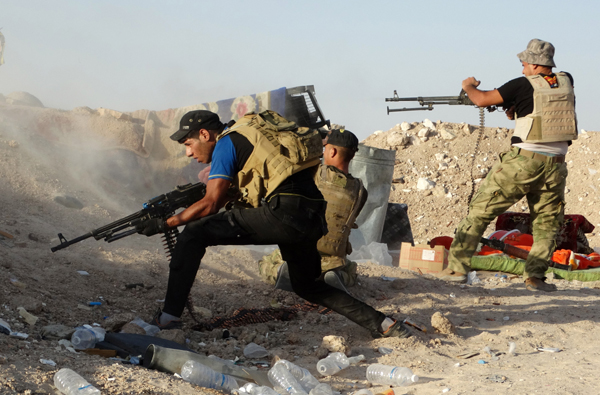Islamic State group creates a nation of fear under its rule
When the Islamic State fighters burst into the Iraqi village of Eski Mosul, Sheikh Abdullah Ibrahim knew his wife was in trouble.
Buthaina Ibrahim was an outspoken human rights advocate who had once run for the provincial council in Mosul. The Islamic State fighters demanded she apply for a "repentance card". Under the rule of the extremist group, all former police officers, soldiers and people whose activities are deemed "heretical" must sign the card and carry it with them at all times.
"She said she'd never stoop so low," her husband said.
Buthaina Ibrahim was an outlier in her defiance of the Islamic State. It would cost her dearly.
The "caliphate", declared a year ago, demands obedience. Untold numbers have been killed because they were deemed dangerous to the Islamic State group, or insufficiently pious; 5 million to 8 million endure a regime that has swiftly turned their world upside down, extending its control into every corner of life to enforce its own radical interpretation of Islamic law, or Sharia.
The Islamic State is a place where men douse themselves with cologne to hide the odor of forbidden cigarettes; where taxi drivers or motorists usually play the Islamic State radio station, since music can get a driver 10 lashes; where women must be entirely covered, in black, and in flat-soled shoes; where shops must close during Muslim prayers, and everyone found outdoors must attend.
There is no safe way out. People vanish - their disappearance sometimes explained by an uninformative death certificate, or worse, a video of their beheading.
"People hate them, but they've despaired, and they don't see anyone supporting them if they rise up," said a 28-year-old Syrian who asked to be identified only as Adnan, the nickname he uses in political activism, in order to protect his family, which still lives under Islamic State rule. "People feel that nobody is with them."
The Associated Press interviewed more than 20 Iraqis and Syrians describing life under the group's rule. One AP team traveled to Eski Mosul, a village on a bend in the Tigris River north of Mosul, where residents emerged from nearly seven months under Islamic State rule after Kurdish fighters drove the extremists out in January. Islamic State forces remain dug in only a few kilometers away, so close that smoke is visible from fighting on the front lines.
Another AP team traveled to the Turkish border cities of Gaziantep and Sanliurfa, refuges for Syrians who have fled Islamic State territory.
The picture they paint suggests the Islamic State's "caliphate" has evolved into an entrenched pseudo-state, based on a bureaucracy of terror. Interviewees provided AP with some documents produced by the IS ruling machine - lists inventorying weapons held by local fighters, leaflets detailing rules of women's dress, detailed forms for applying for permission to travel outside Islamic State territory. All emblazoned with the Islamic State black banner and logo "Caliphate in the path of the prophet."
Adnan described the transformation that the Syrian city of Raqqa underwent after the Islamic State took it over in January 2014. At the time, he fled, but after a few months of missing his family, he returned to see if he could endure life under the extremists. He lasted for almost a year in the city, now the Islamic State de facto capital. He spoke to AP in the Turkish border town of Gaziantep.
The once-colorful, cosmopolitan Syrian provincial capital has been transformed, he said. Now, women covered head to toe in black scurried quickly to markets before rushing home. Families often didn't leave home to avoid any contact with the "Hisba" committees, the dreaded enforcers of the innumerable Islamic State regulations.
Islamic State fighters turned a soccer stadium into a prison and interrogation center, known as "Point 11". The city's central square was referred to by residents as "Jaheem Square" - Hell Square, an execution site where Adnan said he saw the corpses of three men left dangling for days as a warning.
|
Iraqi security forces defend their positions on Monday against an Islamic State group attack in Husaybah, 8 km east of Ramadi, Iraq. Iraqis and Syrians who have escaped the group's rule say the "caliphate" is based on a bureaucracy of terror. Associated Press |



















